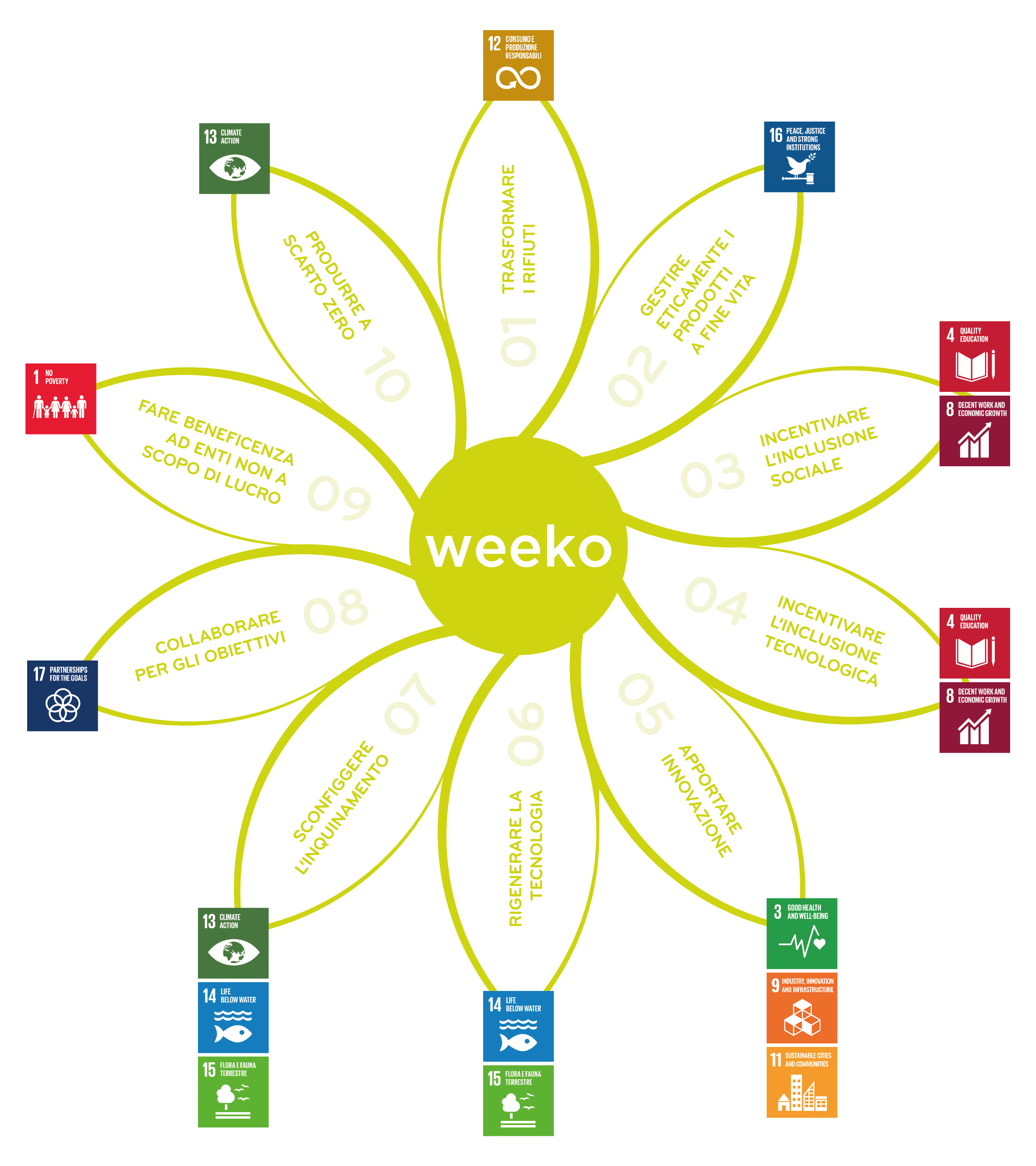2025 GOALS

FOR R³
The Weeko 2025 Agenda for achieving the R3 is a sustainable action program that responds in a concrete and shared way to the exhortations launched by the UN 2030 Agenda.
2025 Agenda
Weeko program
Responding concretely to the 17 UN Sustainable Development Goals, Weeko 2025 Agenda incorporates an action program in the field of “clean and inclusive” management of end-of-life technology, for a total of 10 objectives aimed at the development of decent social work, the reduction of technological inequality and, last but not least, environmental pollution.
The Weeko project was born in 2010 and, through the 2025 Agenda, partnerships are sought to achieve the objectives over the next 3 years: together we add up the commitment to lead the world on the way of sustainability.
01. TRANSFORMING E-WASTE
02. WEEE ETHICAL MANAGEMENT
03. SOCIAL INCLUSION
04. TECHNOLOGICAL INCLUSION
05. GENERATING INNOVATION
06. REGENERATING TECHNOLOGY
07. BEAT POLLUTION
08. PARTNERSHIP FOR THE GOALS
CHARITY TO NON-PROFIT ORGANIZATIONS
10. ZERO WASTE
01. TRANSFORMING E-WASTE
By transformation of WEEE we mean the promotion of management efficiency and maximization of the performance of the Office and IT corporate assets in end-of-life through the responsible disposal and enhancement of the same. Its implementation contributes to the implementation of circular economy plans and to the reduction of economic and environmental costs.
Goal N.01 of the 2025 Weeko Agenda responds to the Goal N.12 of the UN Agenda 2030.
Consumption and sustainable production aim to “do more and better with less”, increasing the benefits in terms of well-being deriving from economic activities, through the reduction of the use of resources, degradation and pollution in the entire production cycle , thus improving the quality of life.
source: UNIRIC – OB.12
02. WEEE ETHICAL MANAGEMENT
The contractualization and ethical management of WEEE is a requirement at the entrance in order to establish a collaborative dialogue between the partners of the Agenda 2025 Weeko. Its implementation contributes to the development of effective, accountable and transparent institutions and guarantees a responsible decision-making process, open to all, participatory and representative at all levels.
Goal N.02 of the 2025 Weeko Agenda responds to the Goal N.16 of the UN Agenda 2030.
Goal number 16 of the Sustainable Development Goals is dedicated to promoting peaceful and inclusive societies for sustainable development, and also aims to provide universal access to justice, and to build responsible and effective institutions at all levels.
source: UNIRIC – OB.16
03. SOCIAL INCLUSION
The job opportunities deriving from the WEEE transformation process, understood as the recovery of assets and raw materials, are intended for the creation of quality jobs for people with disabilities, including social ones. Its implementation contributes to social inclusion and equitable access to a quality and cost-effective technical and vocational education.
Goal N.03 of the 2025 Weeko Agenda responds to the Goal N.04 and 8 of the UN Agenda 2030.
Quality education is the basis for improving people’s lives and achieving sustainable development.
source: UNIRIC – OB.4
Economic and sustainable growth will require companies to create conditions that allow people to have quality jobs, which stimulate economies and at the same time do not harm the environment.
source: UNIRIC – OB.8
04. TECHNOLOGICAL INCLUSION
Being an active part in the development of social technological progress, in particular of the less well-off, means generating conditions of equal access to technology: Weeko’s commitment consists in allocating part of the regenerated equipment to those who in fact could not use it. Its implementation contributes to the achievement of the goals for universal education and to the reduction of inequalities between people.
Goal N.04 of the 2025 Weeko Agenda responds to the Goal N.04 of the UN Agenda 2030.
Ensure access to higher education – including vocational training, information and communication technologies and technical, engineering and scientific programs – in both developed and developing countries.
source: UNIRIC – OB.4
05. GENERATING INNOVATION
Weeko has the task of identifying methodologies for the reuse and recycling of raw materials and objects that would normally be considered waste, in order to reinsert them within the new production cycle to generate innovation, such as design objects for street furniture. or medical prostheses, both eco-sustainable.
Goal N.05 of the 2025 Weeko Agenda responds to the Goals N.03, 09 and 11 of the UN 2030 Agenda.
Support internal technological development, research and innovation in developing countries, also ensuring a favorable environmental policy, inter alia, for industrial diversification and added value to products.
source: UNIRIC – OB.9
By 2030, provide universal access to safe, inclusive and accessible green and public spaces, especially for women, children, the elderly and the disabled.
source: UNIRIC – OB.11
06. REGENERATING TECHNOLOGY
The possibility of transforming end-of-life technological devices into refurbishe (second-life) products represents the precious opportunity to prevent and significantly reduce all forms of pollution, marine and land.
Goal N.06 of the 2025 Weeko Agenda responds to the Goals N.14 and 15 of the UN Agenda 2030.
By 2025, prevent and significantly reduce all forms of marine pollution, especially that deriving from activities carried out on land.
source: UNIRIC – OB.14
Take effective and immediate actions to reduce the degradation of natural environments, stop the destruction of biodiversity.
source: UNIRIC – OB.15
07. BEAT POLLUTION
Thanks to the responsible recycling and reuse of refurbished objects and extracted materials, the need to extract and process raw materials for the manufacture of new products is reduced.
Goal N.07 of the 2025 Weeko Agenda responds to the Goals N.13, 14 and 15 of the UN 2030 Agenda.
Integrate climate change measures into national policies, strategies and planning.
source: UNIRIC – OB.13
By 2025, prevent and significantly reduce all forms of marine pollution, especially that deriving from activities carried out on land.
source: UNIRIC – OB.14
Take effective and immediate actions to reduce the degradation of natural environments, stop the destruction of biodiversity.
source: UNIRIC – OB.15
08. PARTNERSHIP FOR THE GOALS
To be successful, the sustainable development agenda requires partnerships between governments, the private sector and civil society.
These inclusive partnerships, built on principles and values, on a common vision and shared goals, which put people and the planet at the center, are needed at the global, regional, national and local levels.
Goal N.08 of the 2025 Weeko Agenda responds to the Goal N.17 of the UN Agenda 2030
Strengthen North-South, South-South cooperation, triangular regional and international cooperation and access to scientific discoveries, technology and innovations, and improve knowledge sharing on the basis of agreed modalities through greater coordination between existing mechanisms especially at the level of the United Nations and through a global mechanism of access to technology.
Promote the growth, exchange and dissemination of environmentally friendly technologies in developing countries at favorable conditions, through facilitated and preferential agreements established by mutual agreement.
source: UNIRIC – OB.17
CHARITY TO NON-PROFIT ORGANIZATIONS
The Weeko program plans to allocate part of the proceeds deriving from the process of recovering raw materials and their transformation to non-profit
organizations, helping to ensure that all men and women, especially the poorest and most vulnerable, have equal rights to resources. economic.
Goal N.09 of the 2025 Weeko Agenda responds to the Goal N.01 of the UN 2030 Agenda.
Ensure adequate mobilization of resources from different sources, including through development cooperation, in order to provide adequate and reliable means for developing countries, in particular least developed countries, by implementing programs and policies to end poverty in all its forms.
Create robust national, regional and international policy systems based on pro-poor and gender sensitive development strategies to support accelerated investment in poverty alleviation.
source: UNIRIC – OB.1
10. ZERO WASTE
The “zero waste” is the key objective of the entire Weeko program, it represents a global challenge but can only be achieved through the awareness and concrete actions of each individual. Its implementation goes through a considerable institutional, behavioral and technological change that will offer a better chance for global warming not to exceed the maximum threshold.
Goal N.10 of the 2025 Weeko Agenda responds to the Goal N.13 of the UN Agenda 2030.
Improve education, awareness and human and institutional capacity for climate change mitigation, adaptation, impact reduction and early warning.
source: UNIRIC – OB.13



